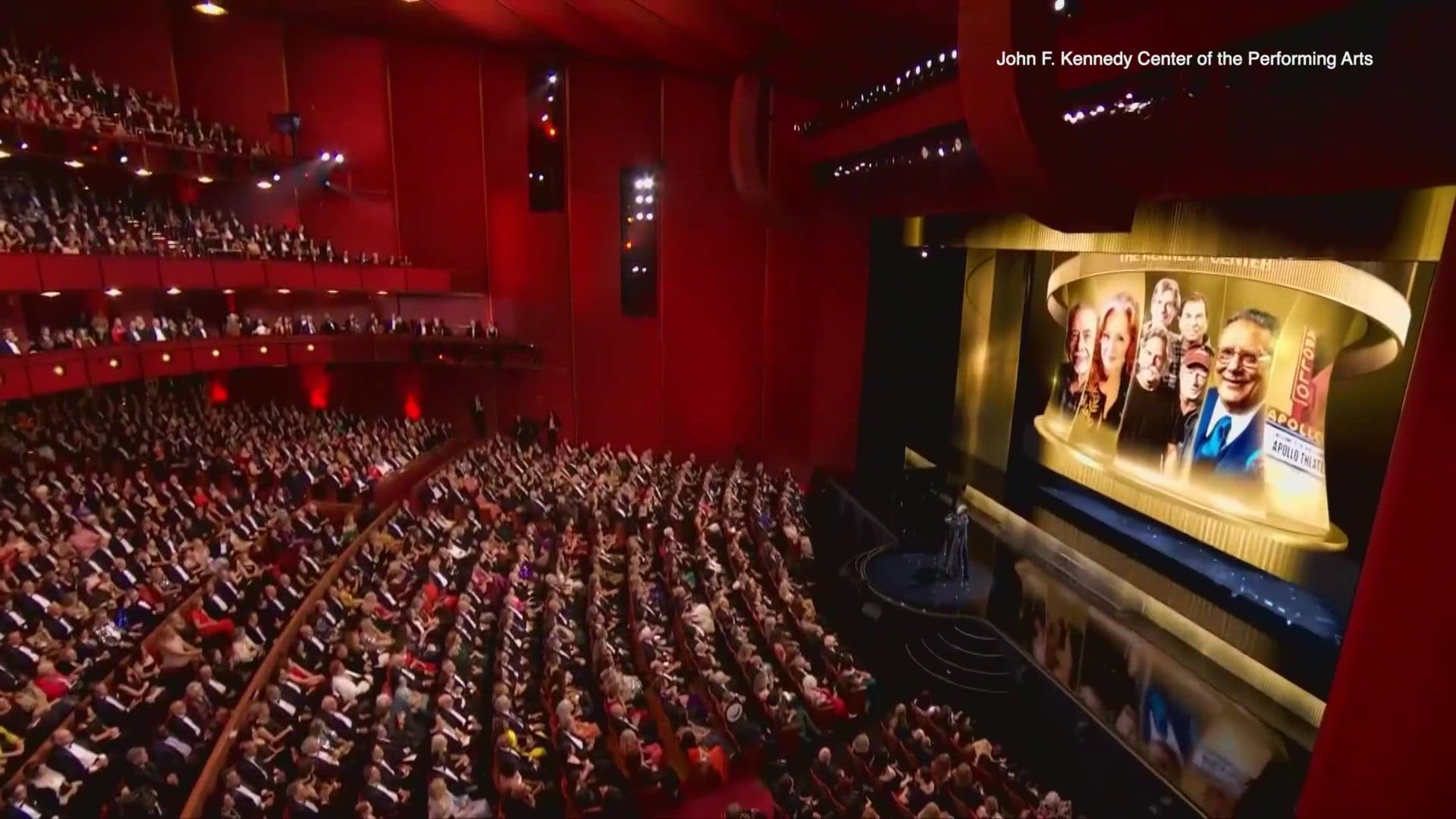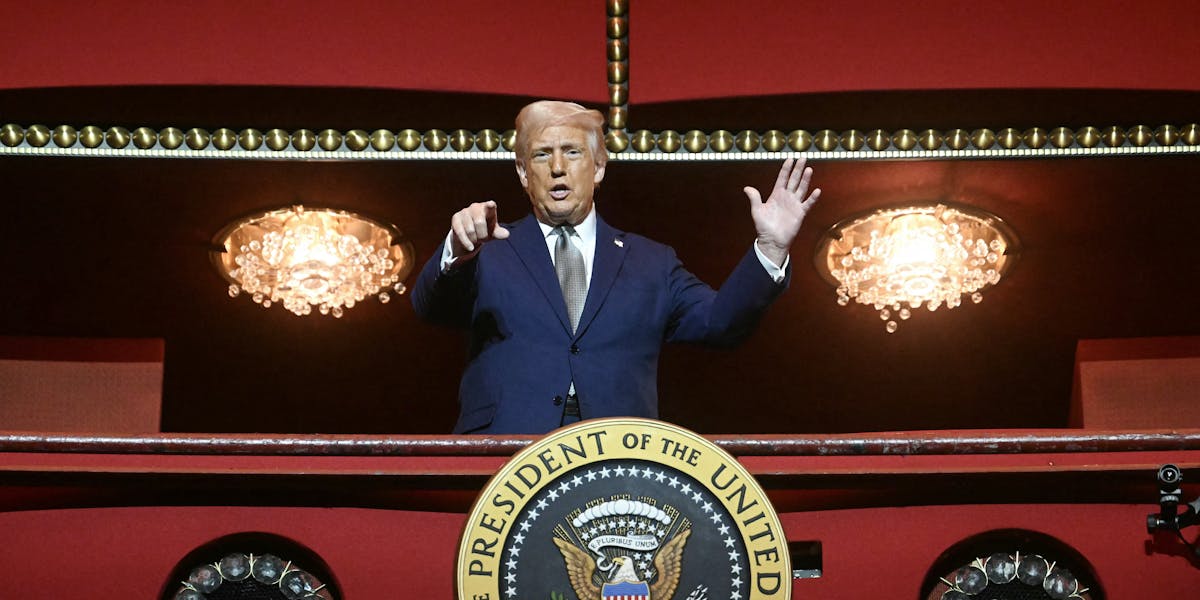On June 11, 2025, former President Donald Trump and former First Lady Melania Trump made a highly publicized appearance at the John F. Kennedy Center for the Performing Arts in Washington, D.C., attending the opening night of Les Misérables. The event served as both a cultural moment and a political statement, as Trump continues to assert influence over major national institutions.

Glamorous Arrival Underscores Media Spotlight
The couple arrived hand-in-hand in formal evening attire, drawing attention from the press and theatergoers. Trump wore a classic black tuxedo, while Melania appeared in a one-shoulder black gown with metallic heels and gold detailing. Her look included oversized sunglasses, adding a fashion-forward edge to an otherwise traditional ensemble. The visual presence of the Trumps on opening night was seen as symbolic of their larger ambitions within cultural spaces.
Trump’s Takeover of the Kennedy Center Leadership
Earlier in February 2025, Trump assumed the newly created role of board chair at the Kennedy Center after removing its former leadership. This leadership shift included the ousting of David Rubenstein and the appointment of former diplomat Richard Grenell as interim executive director. The overhaul marked a dramatic departure from the Center’s historically bipartisan governance model and ignited debate over political control in the arts.

Pledge to Shift Toward Traditional Programming
As part of his new leadership vision, Trump promised to end what he described as “woke” programming in favor of traditional, “non-political” content. His administration at the Center emphasized showcasing performances that reflect classical values and avoid ideological messaging. Supporters of this shift have praised it as a necessary realignment, while critics argue it undermines inclusivity and artistic freedom.
Mixed Reactions from the Audience
Trump’s appearance at the Les Misérables premiere received a range of responses from the audience. Reports indicated moments of both applause and audible boos, with some attendees turning their backs as he entered. The polarized reactions reflected broader societal divisions and illustrated how even cultural events are now stages for political expression.

Record Fundraising Amid Financial Challenges
Despite the controversy, the evening brought significant financial success for the Kennedy Center. Trump’s team reported raising over $10 million in donor support during the performance. This fundraising surge followed months of financial strain, during which ticket sales reportedly declined by more than 35 percent and subscription renewals dropped sharply. The money raised provided a short-term boost but highlighted the Center’s dependence on politically affiliated support.
Criticism of Infrastructure and Future Renovation Plans
Trump criticized the physical condition of the Kennedy Center, calling attention to what he described as areas of neglect. In particular, he questioned the functionality and aesthetics of The Reach, an expansion completed in 2019. Discussions about potential renovations or repurposing of the space have followed, with Trump and his board signaling intentions to seek congressional funding for restoration projects.

Boycotts and Artist Withdrawals in Protest
The changes in leadership and programming prompted several artists to cancel their affiliations with the Kennedy Center. Notably, Lin-Manuel Miranda withdrew the planned staging of Hamilton, citing opposition to the Center’s new direction. Other prominent artists including Rhiannon Giddens, Issa Rae, Shonda Rhimes, and Ben Folds also severed ties, making clear statements about their values through absence.
Former President Responds to Allegations of Mismanagement
Deborah Rutter, the former Kennedy Center President, publicly refuted allegations of financial mismanagement during her tenure. She stated that the organization had $10 million in reserves when she stepped down and called the criticisms politically motivated. In contrast, interim executive director Richard Grenell accused the former administration of inflating revenue numbers and stated he would refer financial irregularities to authorities, though no formal charges have been reported.

Symbolism of “Les Misérables” in a Divided Climate
The choice of Les Misérables, a production centered on themes of revolution and redemption, added another layer of interpretation to the evening. Some in attendance reportedly heckled political figures such as Vice President J.D. Vance, underscoring the continuing tension between cultural participation and political identity. The performance itself, rich with commentary on justice and resistance, seemed to reflect the broader moment of upheaval within the institution.
Activism and Visibility Inside the Theater
Activists and drag performers were reported to be present in the audience, a visible counterpoint to the changes in programming that had cut LGBTQ-themed performances in recent months. Their presence highlighted the ongoing cultural contest over who belongs in national art spaces and the importance of representation in publicly funded institutions.

A Strategic Programming Pivot Toward Popular Titles
Looking to the future, Trump’s team has announced plans to feature widely known productions such as Chicago, Moulin Rouge!, Back to the Future: The Musical, and Mrs. Doubtfire. These choices are positioned as more accessible to general audiences and part of an effort to revitalize attendance. Whether they will appeal across political divides remains uncertain, but the strategy suggests an emphasis on commercial viability.
Ongoing Operational Hurdles Despite Fundraising Success
While donor support has surged, the Kennedy Center continues to face significant challenges. Staff unionization efforts are underway, community engagement has weakened, and some patrons have permanently withdrawn support. Operational leadership must now balance short-term fundraising gains with long-term sustainability and community trust.

A Historic Break from Institutional Norms
Since its establishment in 1971, the Kennedy Center has been seen as a symbol of bipartisan support for the arts. Traditionally, presidents appointed trustees but refrained from direct involvement in programming. Trump’s self-appointment as board chair and his subsequent directional control mark an unprecedented shift, effectively transforming the institution’s governance model.
Arts Institutions as Cultural Battlegrounds
The evening’s combination of red-carpet glamour, public scrutiny, and ideological overtones symbolized more than an ordinary opening night. It became a flashpoint in a broader debate about the role of art in public life and whether cultural institutions should reflect political leadership or strive for neutrality.
Uncertain Path Forward for a National Institution
As the Kennedy Center continues its transition under new leadership, critical questions remain. Can it retain artistic credibility while appealing to a politically aligned donor base? Will programming changes alienate long-standing audiences, or bring in new ones? The answers will shape not only the future of the Kennedy Center but may also influence similar institutions nationwide.
Conclusion: A Stage for National Conversation
Donald and Melania Trump’s attendance at Les Misérables marked a defining moment at the crossroads of art, politics, and public identity. The event reflected a new era for the Kennedy Center—one marked by confrontation, redefinition, and the potential for reinvention. Whether this era brings unity or further division remains to be seen, but the national conversation it has sparked is already well underway.
Sources
Reuters: Trump greeted with cheers, boos at Les Misérables
San Francisco Chronicle
The Washington Post
Kennedy Center official statement on board changes
Wikipedia
AP News
Politico

